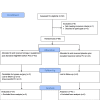Impact of Omega-3 Supplementation on High Sensitive C-Reactive Protein Level and 30-Day Major Adverse Cardiac Events After the Implementation of Coronary Stent in Patients with Chronic Kidney Disease: A Randomized Clinical Study
- PMID: 30276144
- PMCID: PMC6156476
- DOI: 10.15171/apb.2018.055
Impact of Omega-3 Supplementation on High Sensitive C-Reactive Protein Level and 30-Day Major Adverse Cardiac Events After the Implementation of Coronary Stent in Patients with Chronic Kidney Disease: A Randomized Clinical Study
Abstract
Purpose: Studies have revealed that patients with chronic kidney disease (CKD) are more susceptible to adverse effects of percutaneous coronary intervention (PCI). In addition, the role of elevated high sensitive C-reactive protein (hs-CRP) in the prediction of adverse cardiac outcomes after coronary stent implantation has already been shown. Therefore, in this study, we aimed to evaluate the effect of omega-3 supplementation on hs-CRP and 30-day major adverse cardiac events (MACE) in patients with CKD undergoing elective PCI. Methods: In this randomized trial, 80 CKD patients who were candidates for elective PCI, were randomly assigned to two groups; the first group received a single dose of omega-3 (2500 mg, 12 h before PCI) as well as the standard drug regimen of PCI and the second group received placebo plus the standard therapy (325 mg loading dose of aspirin, 600 mg loading dose of clopidogrel, and weight-adjusted intravenous heparin). Hs-CRP levels were measured at baseline and 24 h after the intervention as a primary endpoint. The secondary endpoint was the incidence of MACE over a 30-day period after PCI. Results: Omega-3 did not significantly decrease post-PCI serum level of hs-CRP; however, the overall 30-day MACE was significantly lower in the omega-3 group compared to the control group (p=0.05). Conclusion: Our results revealed the positive effect of the omega-3 supplement on decreasing 30-day MACE; hence, omega-3 may be considered as an effective adjunctive therapy to the standard drug regimen used before PCI. The evaluation of the effect of omega-3 on long-term MACE is recommended for future studies.
Keywords: Chronic kidney disease; High sensitive C-reactive protein; Major adverse cardiac events; Omega-3 supplement; Percutaneous coronary intervention.
References
-
- Coats WC, Dellsperger KC. Advances in Percutaneous Coronary Intervention in Patients with Chronic Kidney Disease. Adv Perit Dial. 2010;26:42–6. - PubMed
LinkOut - more resources
Full Text Sources
Research Materials
Miscellaneous

